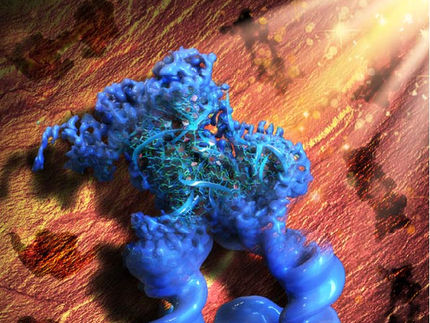With chemical modification, stable RNA nanoparticles go 3-D
For years, RNA has seemed an elusive tool in nanotechnology research — easily manipulated into a variety of structures, yet susceptible to quick destruction when confronted with a commonly found enzyme.
"The enzyme RNase cuts RNA randomly into small pieces, very efficiently and within minutes," explains Peixuan Guo, PhD, Dane and Mary Louise Miller Endowed Chair and professor of biomedical engineering at the University of Cincinnati (UC). "Moreover, RNase is present everywhere, making the preparation of RNA in a lab extremely difficult."
But by replacing a chemical group in the macromolecule, Guo says he and fellow researchers have found a way to bypass RNase and create stable three-dimensional configurations of RNA, greatly expanding the possibilities for RNA in nanotechnology (the engineering of functional systems at the molecular scale).
Their results, "Fabrication of Stable and RNase-Resistant RNA nanoparticles Active in Gearing the Nanomotors for Viral DNA Packaging," are published in ACS Nano.
In their work, Guo and his colleagues focused on the ribose rings that, together with alternating phosphate groups, form the backbone of RNA. By changing one section of the ribose ring, Guo and his team altered the structure of the molecule, making it unable to bind with RNase and able to resist degradation.
"RNase interaction with RNA requires a match of structural conformation," says Guo. "When RNA conformation has changed, the RNase cannot recognize RNA and the binding becomes an issue."
While he says previous researchers have shown this alteration makes RNA stable in a double helix, they did not study its potential to affect the folding of RNA into a three-dimensional structure necessary for nanotechnology.
After creating the RNA nanoparticle, Guo and his colleagues successfully used it to power the DNA packaging nanomotor of bacteriophage phi29, a virus that infects bacteria.
"We found that the modified RNA can fold into its 3-D structure appropriately, and can carry out its biological functions after modification," says Guo. "Our results demonstrate that it is practical to produce RNase-resistant, biologically active, and stable RNA for application in nanotechnology."
Because stable RNA molecules can be used to assemble a variety of nanostructures, Guo says they are an ideal tool to deliver targeted therapies to cancerous or viral-infected cells:
"RNA nanoparticles can be fabricated with a level of simplicity characteristic of DNA while possessing versatile structure and catalytic function similar to that of proteins. With this RNA modification, hopefully we can open new avenues of study in RNA nanotechnology."
Most read news
Other news from the department science
These products might interest you

Eclipse by Wyatt Technology
FFF-MALS system for separation and characterization of macromolecules and nanoparticles
The latest and most innovative FFF system designed for highest usability, robustness and data quality

DynaPro Plate Reader III by Wyatt Technology
Screening of biopharmaceuticals and proteins with high-throughput dynamic light scattering (DLS)
Efficiently characterize your sample quality and stability from lead discovery to quality control

Get the life science industry in your inbox
By submitting this form you agree that LUMITOS AG will send you the newsletter(s) selected above by email. Your data will not be passed on to third parties. Your data will be stored and processed in accordance with our data protection regulations. LUMITOS may contact you by email for the purpose of advertising or market and opinion surveys. You can revoke your consent at any time without giving reasons to LUMITOS AG, Ernst-Augustin-Str. 2, 12489 Berlin, Germany or by e-mail at revoke@lumitos.com with effect for the future. In addition, each email contains a link to unsubscribe from the corresponding newsletter.
More news from our other portals
Last viewed contents
Graffinity and Mutabilis announce second research collaboration - Drug Discovery Collaboration to Focus on Infectious Disease Targets
DEINOVE partners with VTT Technical
Labcyte Receives 19th and 20th Patents for Acoustic Droplet Ejection Applications
Almac’s Clinical Technologies Division undergoes successful joint GCP-GMP MHRA Inspection
Lab21 - a new kind of company - Antiviral drug discovery services and clinical trials support



















































